College has its own language, and it is helpful to become aware of some of these terms as you are looking at college materials, including brochures, course descriptions, cost of attendance information and more.
Here’s a definitive dictionary for this highly specific lexicon that will make you look like you’ve been strolling campus for years, along with phrases that a recent college graduate found useful during her time on campus.
ADD/DROP: The period of time at the beginning of the semester where you can still change your class schedule without penalty. See: Drop date.
ALL-NIGHTER: When a student skips sleep and stays up overnight to cram for an exam or write an entire paper the night before (or finish up any other school work they waited until the last minute to do.)
BLOW-OFF CLASS: A course that students take in order to get class credits without doing very much hard work. Ex: Rocks for Jocks (intro-level geology), Physical Science (science you might’ve learned in elementary school), Bowling 101, Basket Weaving.
COHORT: A group of students working through a curriculum together towards the same degree.
COLLEGE VS. UNIVERSITY: Colleges are generally smaller institutions that focus on undergraduate education. Universities are typically larger institutions that offer more graduate degree options.
CORE COURSES OR CORE CURRICULUM: These include fundamental classes–such as English, math, general science, government, and history–which provide a foundation for major-specific classes. The exact class requirements may vary depending on your major. Core courses may also be referred to as “general education courses.”
CORNHOLE: A simple game, which involves tossing a small bean bag onto a raised platform with various holes in it, trying to get the bag into the holes. This game is played at most football game tailgates and is actually quite fun.
CREDIT HOUR: All degree plans require a certain number of hours of coursework to graduate; a typical class is three credit hours and twelve hours is (usually) considered the course load of a student who is studying “full-time.”
DARTY: Day party. See: Day drinking.
DEAD WEEK/DAYS: The last week of classes leading up to finals where there are typically no new assignments and no or little class. The idea is students will use this time to study. See: Darty
DEAN’S LIST: A list of students based on their academic excellence, usually based on Grade Point Average (GPA), published at the end of each semester.
DROP DATE: Look for this date on your syllabus, especially if it’s a class you’re worries about. Until the drop date, you can drop a class with no penalty academically. (Financially you’re still on the hook–but your GPA might thank you when your pocketbook doesn’t.)
EARLY ACTION VS. EARLY DECISION: Both early action and early decision allow college applicants to apply earlier and find out the results sooner. Generally, students can apply to as many schools as they’d like with early action. But if you apple early decision and are accepted, you must enroll in that school.
ELECTIVES: Classes students choose to fulfill a general education requirement or just because they’re interested in a topic outside of their major’s core courses. See: Blow-off class.
FAFSA: Stands for “Free Application for Federal Student Aid.” A document that prospective students and/or their parents complete to determine eligibility for federal loans and grants.
FIFTEEN-MINUTE RULE: A mythical rule that says if your professor doesn’t show up within fifteen minutes after the class is supposed to start, the students can leave with no penalties. (Do so at your own risk.)
FIFTH-YEAR SENIOR: Not everyone makes it to the graduation ceremony in four years. These are the folks who are still working on earning that degree after Senior Year. See: Victory Lap.
FOMO: Stands for “fear of missing out.” Irrational fear some college students have that they will miss something amazing if they stay home one evening. (Honestly, not true. Get your rest!)
FORMAL: A college dance usually thrown by a sorority or fraternity; typically, an extravagant event but not always requiring a formal gown and tux.
FRESHMAN 15: The fifteen pounds some freshman may (or may not) gain eating dining hall food and snacks during their first semester away from home. (Eating well and taking advantage of the gym, pool, and walking around campus will help you avoid this!)
FRATERNITIES AND SORORITIES: Social and academic organizations for college students formed to pursue a common goal or ideals. Most are identifies by letters of the Greek alphabet (Alpha, Beta, Gamma, etc.) and as a whole comprise what is known as a school’s “Greek life.”
GPA: Stands for “grade point average.” Represents the average of a student’s final grades in all their courses. This is calculated by adding the final grads divided by the number of credit hours, though some classes may be weighted or measured on a different scale.
HYBRID CLASS: A class taught both in person and via Zoom or other means.
LATENIGHT: a party at someone’s house after the bars close. See: Townie.
LOCOTRIP, OR LOW COST TRIPLE: Refers to the lower rate some residence halls offer if you go to a bigger room with a third roommate. Either creates lifelong friends or lifelong nemeses.
MAYMESTER: Classes taken in the month of May, usually right after the spring semester has ended. These classes are often options for students who wish to earn quick credits between main semesters.
MIDTERM: An exam given approximately halfway through a course term that generally covers all course material presented so far. See: All-nighter.
MIXER: When two campus organizations hold an event or party in order for the groups to meet.
N.A.R.P.: A non-athletic regular person.
OFFICE HOURS: Time a professor sets aside so students may meet in their office to discuss grades and assignments or to get remedial help with a subject. Use them!
PASS-FAIL: When you fo not get a letter grade for a class, you . may be eligible to either “pass” the class or “fail” it. If you pass, you earn credit, if you fail, you do not. You’ll get either a “P” or an “F” on your transcript, but it does not usually affect your GPA.
PRACTICUM: A course designed to give students a practical application of what they have been learning in their major.
PREGAME: Refers to the hangout before going out to a party or out on the town.
PRE-REQUISITE: A class required to take as entry to a higher-level course.
REGULAR DECISION: The most common timeline for college admissions. For regular decision, most schools require prospective students to apple by early January so applicants can hear back by April 1st.
RIZZ: Effortless ability to charm people.
RUSH: Greek life’s way of recruiting people to be a part of their sorority/fraternity organization.
SHOWER CADDY: Your new best friend. This will hold all the toiletries you need to brave the dorm hall collective showers. If you have a private bathroom, you’re missing out on the real freshman experience.
SPREAK: Slang for Spring Break.
“SYLLY” WEEK: The first week of the semester where most class time is spent going over the course syllabus. Some students use it as an excuse to go our rather than study. See: Darty
SHOTBOOK: A scrapbook put together for a girls’ 21st birthday.
T.A.: Stands for “Teacher’s Assistant.” A professor’s assistant that aids in grading and teaching–often, this is a graduate student who is usually there for you when your professor isn’t available.
TOWNIE: Usually someone who grew up in the college town but isn’t affiliated with the college. They’ll be sure to tell you how much better the town was back in the day.
WEED-OUT CLASS: Some of the first classes within your major designer to be hard in order to eliminate or identify students who do not perform well enough to continue or move on.


